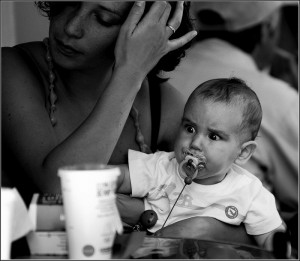The Oedipus complex in young males
The tale of Oedipus, the mythical Greek king of Thebes, and the fulfillment of his tragic fate continues to be a source of wonderment and odd inspiration. The story begins with the King Laius and Queen Jocasta of Thebes frustrated at their inability to conceive. While seeking advice, an Oracle prophesizes that if they bear a son, the child would inevitably murder the King and marry the Queen. When Queen Jocasta gave birth to Oedipus, in an act of desperation Laius passed the child onto a shepherd to abandon. The shepherd passed the child to King Polybus and Queen Merope in Corinth.

An adult, Oedipus sought advice from the same Oracle that his biological parents sought. When it told him that he would murder his father and marry his mother, he fled Corinth to prevent such a destiny. In his travels, he is confronted by the unidentified King Laius, who Oedipus murders in an act of self-defense. Upon his return to Thebes, he is offered kingship and the widow of his father – his own mother. With the prophecy fulfilled, life becomes full of suffering for Thebes. The story of Oedipus has had many layers of meaning attached to it, some literal and some figurative. Sigmund Freud combined elements of the literal and figurative: he audaciously asserted that this story of Oedipus was universal in every male ever born.
The Oedipus Complex occurs between the ages of three to five in young boys. In the stages of psychosexual development that Freud outlined, it coincides with the phallic stage. This is the setting for the greatest sexual conflict in where the genital region becomes the centre of focus in the psychosexual drive of the young male. The stage is characterized by the intense emotions that accompany it. These sentiments were unfelt in their first three years of dependency towards their adults. Feelings of extreme admiration and worship juxtapose with the feelings of rage and bad blood that occur at the same time within the boy.
For these young lads, the sentiments of absolute love are projected towards their opposite-sexed parent. Thus, the male libido begins to kick in (which physiologically they cannot act upon until puberty) as this beautiful coming-of-age theory suggests that boys begin to resent their fathers for standing the way of their increasingly non-Platonic love for their mothers. Consequently, boys have murderous intentions towards their father, if only so they can be with their mothers, as Oedipus was with Queen Jocasta.
During the phallic stage, these jealous feelings were not originating in the mind. Rather, they orbited around the penis. What controls this urge in boys to eliminate the father from the equation was their castration anxiety ñ the fear that his father would be willing to remove their common appendage. As a result, healthy resolution to this stage of psychosexual development required a sense of empathy towards their same-sexed parent. Boys, realizing their place in their relationship with their father, would begin to imitate them, rather than spite them. This imitation of the father, Freud asserted, would act as a moral voice for the child for the rest of their life. So, role models were essential. Freudís psychosexual theory stated that when the phallic stage was successfully resolved, sexual dormancy would be exhibited until puberty.
[ad#downcont]However, if parents were excessively prohibitive or stimulating during this stage, Freud believed the Oedipus complex could not be resolved in a healthy manner. Neurosis, perversions, and psychosexual disorders would become its product. Indeed, Freud ominously warned: “If the ego has in fact not achieved much more than a repression of the complex, the latter persists in an unconscious state in the id and will later manifest its pathogenic effect”
